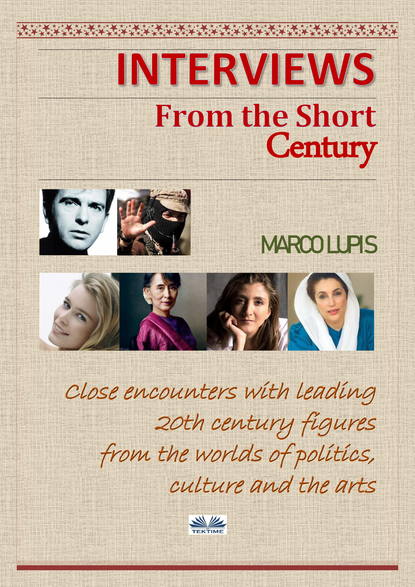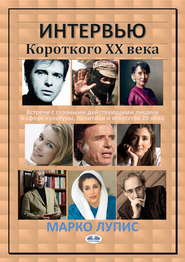По всем вопросам обращайтесь на: info@litportal.ru
(©) 2003-2024.
✖
Interviews From The Short Century
Настройки чтения
Размер шрифта
Высота строк
Поля
In October 1998, having retired as Commander-in-Chief of the Chilean army and been appointed Senator-for-life, Pinochet was arrested while in London for medical treatment and placed under house arrest. First at the clinic where he had just undergone back surgery, and then in a rented house.
The international arrest warrant had been signed by a Spanish judge, Baltasar Garzón, for crimes against humanity. The charges included nearly a hundred counts of torture of Spanish citizens and count of conspiracy to commit torture. The UK had only recently signed the United Nations Convention against Torture, meaning that all the charges related to events that occurred during the final fourteen months of his rule.
The Chilean government immediately opposed his arrest, extradition and trial. Thus began a hard-fought, sixteen-month battle in the House of Lords, then the highest court in the UK. Pinochet claimed diplomatic immunity as a former head of state, but the Lords refused in light of the severity of the charges and authorised the extradition, albeit with several restrictions. However, shortly afterwards, a second ruling by the Lords enabled Pinochet to avoid extradition on health grounds (he was eighty-two years old at the time of his arrest), for âhumanitarianâ reasons. Following medical assessments, the British Home Secretary Jack Straw authorised Pinochet to return to Chile in March 2000, nearly two years after he was put under house arrest.
It was at the end of March 1999, in the midst of this complex international legal battle, that I went to Santiago to monitor the situation for the daily Il Tempo and to interview Pinochetâs eldest daughter, LucÃa. The House of Lords had just rejected Pinochetâs claim for immunity, and the plane that the generalâs family and supporters had hoped would bring him home to Chile returned without him.
The reaction on the streets of Santiago was immediate. On March 24, the Chilean capital had awaited the ruling with bated breath. The city may not have been in lockdown, but there was a discrete Carabineros - military police - presence at potential flashpoints: the presidential seat at La Moneda, the British and Spanish embassies, and the headquarters of pro- and anti-Pinochet organisations. There was blanket media coverage, enabling Chileans to follow events minute by minute. With live satellite links to London, Madrid and various locations in Santiago starting at seven in the morning and lasting all day, it felt like a truly historical event. At around midday local time, less than an hour after the Lords had issued their ruling, two afternoon dailies were published in special edition. The headline of one of them put it very neatly: âPinochet loses but winsâ.
In the morning, the residents of Santiago had crowded round televisions in public places, from McDonald's to the smallest of bars, to follow all the crucial developments. Angry customers in one large city-centre store beseeched the manager to tune the TV into the live feed from London.
The situation had remained broadly calm until the late afternoon, when the first signs of tension began to surface. At four oâclock local time, there were the first clashes between students and the police in the city centre, at the crossroads between La Alameda
and Miraflores, with a dozen or so people injured and around fifty students arrested.
There were plenty of appeals for calm, mainly from members of the government. The inflammatory remarks from General Fernando Rojas Vender (the pilot who bombed La Moneda during the 1973 coup dâétat and the commander of the Chilean Air Force), who on the previous Tuesday had publicly stated that the climate in Chile was becoming âsimilar to how it was in 1973â had been condemned in the strongest terms by the government, which forced Rojas into a public retraction.
Now all eyes were on Mr Straw. The propaganda machine of Pinochetâs supporters was ready to roll, aiming to discredit the British Home Secretary whom they accused of publicly and forcefully endorsing the Chilean left on a trip to the country in 1966. Some people claimed they could prove that the young Mr Straw had held an informal meeting with the Chilean president at the time, Salvador Allende, who had invited him for tea.
As you can imagine, there were plenty of things I wanted to discuss as I made my way to LucÃa Pinochet's house.
*****
Inés LucÃa Pinochet Hiriart is Augusto's oldest daughter. She is an attractive woman who carries her age well and her tainted surname even better. The only reason she is not with her siblings in London, by her father's side, is that she has her leg in plaster. So she has been forced to stay in Santiago with the unenviable task of representing, and above all defending, the Senator-for-life.
We meet in her beautiful home in a well-to-do part of the city, and with her windows open we can hear demonstrators chanting pro-Pinochet slogans. With her three sons - Hernán, Francisco and Rodrigo - by her side, she speaks to me for nearly an hour, during which we cover the current situation with her father and, inevitably, the future of Chile as a whole.
What do you make of the âhumanitarianâ ruling that has just been given in your fatherâs case?
I would rather my father had been granted the full immunity he was entitled to as the former head of a sovereign state. Instead of a criminal trial, it has become a political debate about alleged torture, genocide and other crimes, bowing to pressure from socialists and people who claim they want to defend human rights.
Have you spoken to your father? How has he taken it?
My father is not happy about it. They had warned him about the possibility of a âhumanitarianâ ruling. And he's certainly not best pleased about Jack Straw handling the whole thing.
This is the man who people here claim took tea with Salvador Allende on a visit to Chile in 1966?
Exactly. Weâve known this for years. When they arrested my father in London, Straw said he had achieved a lifetimeâs ambition. Go figure.
So this has now shifted from being a legal case to a humanitarian one...
It's always been all about politics! It was nonsense ever talking about a trial; the only things on the agenda in London should have been presidential immunity and territorial sovereignty, not torture.
Nevertheless, many commentators have observed that this is an historical ruling that sets an important legal precedent. Do you share that view?
Of course, because it's the first time we have seen a situation like this. Remember, international conventions have been in place for many years, but there has never been a trial nor a court of justice for judging and possibly punishing human rights violations. My father is being used as a guinea pig!
What is your father's state of health?
You must remember he is eighty-three years old and has just gone through major surgery. He's recovering slowly, but he's diabetic and he needs daily treatment and check-ups.
Do you fear for his health if he is extradited?
Yes, it could really set him back. And Iâm particularly worried about my mother's health. She hasn't felt up to following the most tense moments of the case. When she heard the Lordsâ sentence on TV, she was taken ill and the doctors had to give her several injections to reduce her blood pressure.
Do you feel let down by the English justice system?
No, because I don't think this is about the English as a whole. It's more about the people currently in power in the UK. And as we know, they are lefties.
Do you think there are people in England who are sympathetic to your cause?
Lots of English people are behind us. I discovered that when I was over there recently. Lots of people came up to me to show their solidarity. And it's not in their interests, because my fatherâs case is costing the British taxpayer a lot of money.
Do you think President Frei has acted strongly enough?
I think he could have been a little more forceful, but he's done enough and I thank him for that. I definitely would have liked to see him ensure that the international community treats our country with the respect it deserves. It is unacceptable that a former head of state, senator and commander-in-chief is being detained abroad.
How do you plan to mark the occasion if your father returns to Chile?
With the family. Having him come home will be the biggest celebration of all.
On his return, will he go straight back to the Senate or, as some people here are suggesting, will he allow the dust to settle and first spend some time in one of his many houses, like in Bucalemu, El Melocotón or Iquique?
Look, I honestly donât know why people over here are getting so worked up about it. The last thing my father wants is to cause problems. To harm or create division in Chilean society. All he wants is for Chile to finally be able to move towards lasting peace and national reconciliation, so it can continue along the difficult path to economic growth. Thatâs why he may not make an immediate return to the Senate if he thinks it will help.
Have you spoken to him about it?
No, it's just what I think. What he has said to me though, time and again, is that he desperately wants to come back without causing any problems. My father wants to be a force for unity, not division.
Do you think your father is ready to hand himself over to the Chilean authorities?
Iâm utterly convinced that he's happy to answer any questions they may have for him. That doesnât mean he feels guilty; he knows he's not guilty. But, as I said, he has always had, and continues to have, great respect for the Chilean justice system.
Do you agree with your brother Marco Antonioâs assertion that there were abuses of power during your fatherâs period of rule?
My brother and I sometimes phrase things differently, but Iâve always maintained that there were occasional abuses. Remember, though, that this was a terribly difficult period in Chileâs tumultuous history - out-and-out war, an underground struggle between two sides. Thatâs why both sides occasionally overstepped the mark.
Do you think your father should ask for forgiveness?
My father does not feel guilty. If you think you're innocent, what are you asking for forgiveness for?
Do you agree with the recent comments of General Fernando Rojas Vender, who said that the climate in Chile was becoming similar to the period of office of the Popular Unity alliance?
General Rojas was only telling it how it is. The country is being torn apart and risks falling headlong into an uncertain and tragic future.
What do you make of the armed forcesâ attitude to your fatherâs detention? There's talk of itchy trigger fingers.
If I were a military person, and a former commander-in-chief of my country had been arrested abroad, I would be outraged. I would see it as an attack on my country's sovereignty and a lack of respect towards the army. In fact, I think the military has shown remarkable restraint so far. Iâm not sure I would have done in their position.






